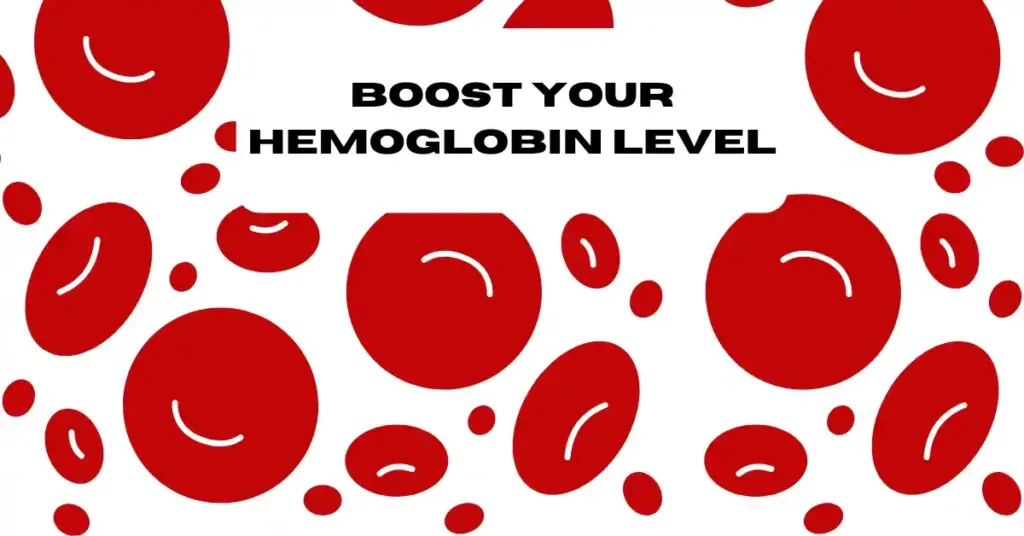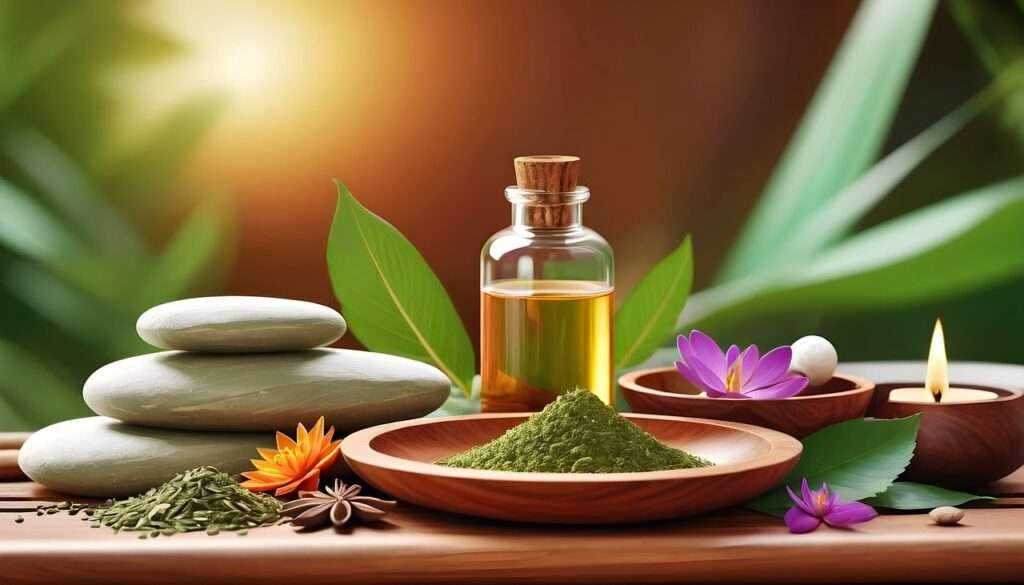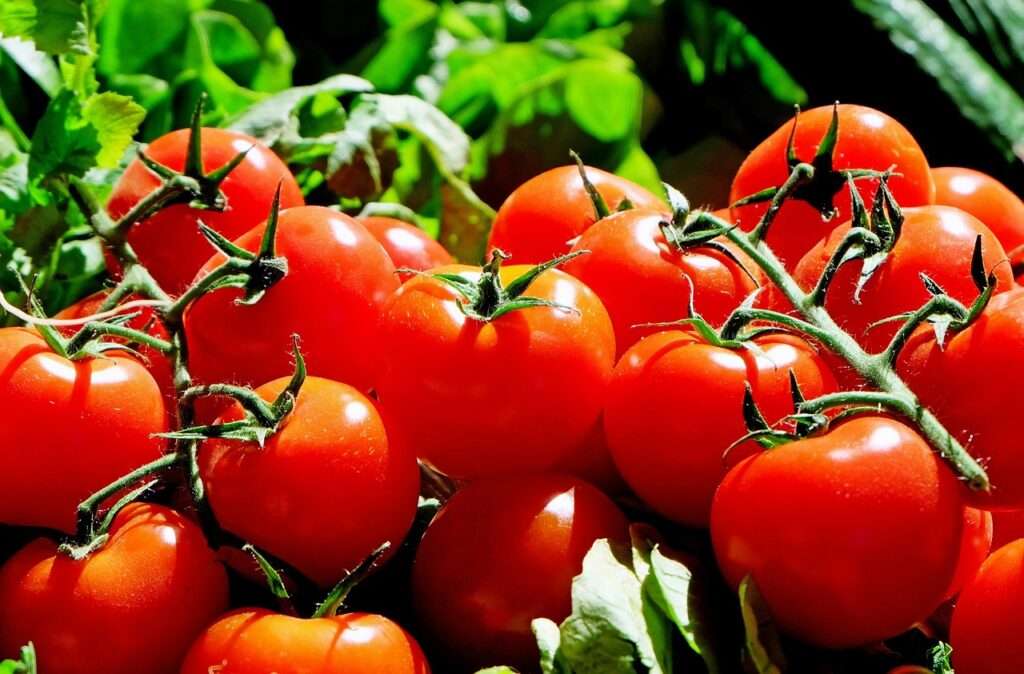Introduction
Hemoglobin, the iron-rich protein found in red blood cells, plays a vital role in transporting oxygen throughout the body. Maintaining healthy hemoglobin levels is crucial for overall well-being, as it ensures that your organs and tissues receive the oxygen they need to function optimally. Whether you’re an athlete seeking to enhance your performance or simply someone looking to improve your energy levels, understanding how to increase hemoglobin levels can be a game-changer.
In this comprehensive article, we’ll delve into the world of hemoglobin, exploring its significance, the consequences of low levels, and the various strategies you can employ to naturally boost your body’s oxygen-carrying capacity. From dietary approaches to lifestyle modifications, we’ve got you covered with practical tips and insights to help you unlock the power of hemoglobin.
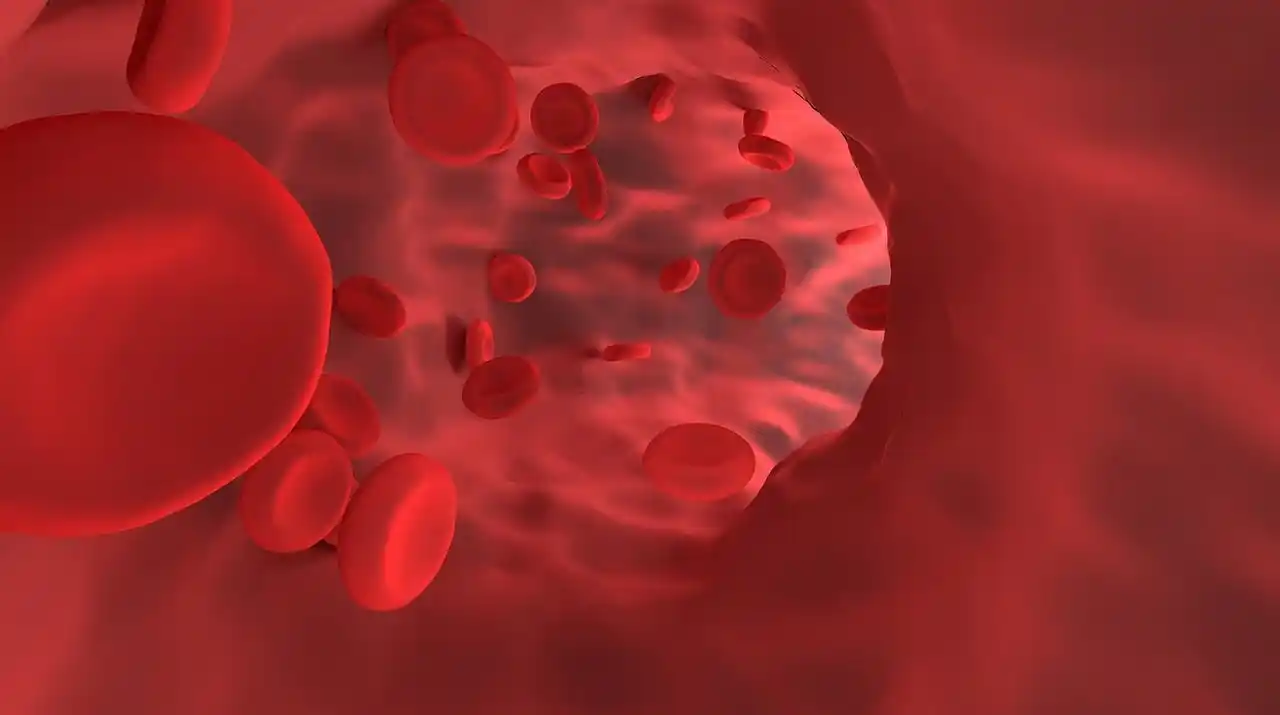
Dietary Approaches to Increase Hemoglobin Levels Naturally
Boosting Hemoglobin Levels through Dietary Interventions
- Include Iron-Rich Foods: Animal-based sources like lean meats, poultry, fish, and organ meats, and organ meats like liver and kidneys are rich in iron and essential nutrients like vitamin B12 and folate.
- Opt for Plant-based Iron-Rich Foods: Vegetarians or vegans can incorporate beans and legumes, leafy green vegetables like spinach, kale, and collard greens into their diet.
- Ensure Sufficient Folate Intake: Spinach, beans and peanuts, and citrus fruits are excellent sources of folate and vitamin B9, which support red blood cell synthesis and hemoglobin production.
- Enhance Iron Absorption with Vitamin C and Beta-Carotene: Pair iron-rich foods with vitamin C-rich sources and incorporate beta-carotene-rich foods like sweet potatoes, carrots, and leafy greens.
Other Lifestyle Strategies to Support Healthy Hemoglobin Levels
- Regular physical activity: Exercise stimulates red blood cell and hemoglobin production, especially cardiovascular health-promoting activities like brisk walking, jogging, cycling, or swimming.
- Adequate hydration: Consume plenty of fluids throughout the day and incorporate hydrating foods like fruits and vegetables into your diet.
- Stress management: Prioritize stress-reduction techniques like meditation, yoga, or deep breathing exercises to maintain a healthy balance.
- Quitting smoking: Seek support to quit smoking, which impairs oxygen delivery and can lower hemoglobin levels.
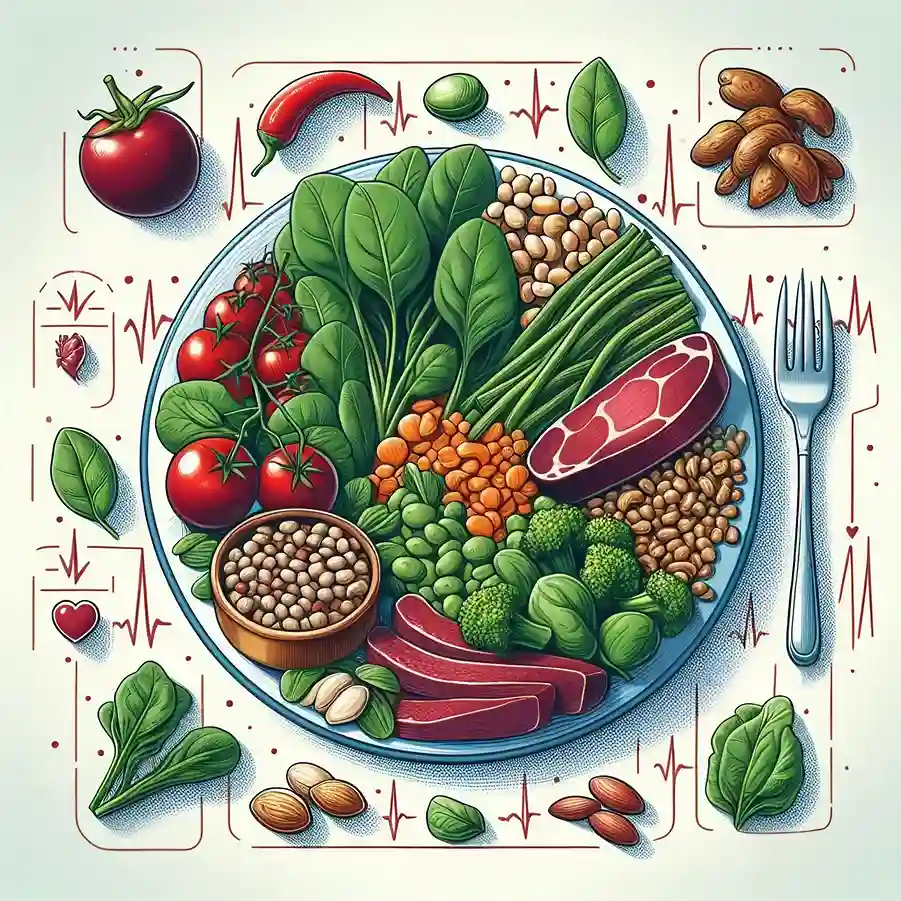
Causes, Symptoms, and Treatment of Low Hemoglobin Levels
Low hemoglobin levels, often known as anemia, can result from a variety of reasons, manifest with varied symptoms, and necessitate different treatment techniques depending on the underlying issue. Here’s a quick summary of the key points you need to remember.
Causes:
- Nutritional deficiencies: Lack of iron, folic acid, or vitamin B12.
- Genetic conditions: Sickle cell anemia, thalassemia.
- Chronic diseases: Tuberculosis, chronic renal failure.
- Blood loss: Heavy menstrual bleeding, gastrointestinal bleeding.
- Bone marrow and stem cell problems: Lymphoma, leukemia, aplastic anemia.
- Other factors: Pregnancy, growth spurts in children, recent surgeries.
Symptoms:
- General weakness and fatigue.
- Shortness of breath and fast heartbeat.
- Pale skin, chest pain.
- Dizziness and body aches.
- Swelling in hands and feet.
Treatment:
- Dietary changes: Increase intake of iron-rich foods.
- Supplements: Iron, vitamin B12, or folic acid supplements.
- Medication: To treat underlying chronic diseases.
- Blood transfusions: In cases of severe anemia.
- Surgery: If caused by bleeding ulcers or tumors.
A balanced diet rich in key nutrients, as well as frequent medical check-ups to monitor hemoglobin levels, are recommended as preventative measures. It is critical to consult healthcare specialists for an accurate diagnosis and treatment plan customized to the individual’s needs. If you suspect low hemoglobin levels, a simple blood test can confirm the diagnosis and guide your therapy.
How to increase hemoglobin in a week
If you want to increase your hemoglobin levels in a week, here are some natural ways to achieve it:
- Increase Iron Intake:
- Iron insufficiency is a common reason for low hemoglobin levels. Eat more iron-rich foods, such as:
- Meat, fish, and poultry
- Organ meats
- Beans and legumes
- Eggs
- Leafy green vegetables like kale and broccoli
- Nuts and seeds
- Iron insufficiency is a common reason for low hemoglobin levels. Eat more iron-rich foods, such as:
- Boost Folate Intake:
- Folate, a kind of B vitamin, is required for hemoglobin formation. Include foods high in folate:
- Spinach
- Beans, such as kidney beans
- Peanuts
- Fruits
- Whole grains
- Sunflower seeds
- Before considering folate supplements, it’s important to consult with a healthcare professional for personalized advice.
- Folate, a kind of B vitamin, is required for hemoglobin formation. Include foods high in folate:
- Maximize Iron Absorption:
- Certain vitamins and minerals improve iron absorption. This includes:
- Vitamin C: Found in oranges, strawberries, papaya, guava, and sweet red peppers.
- Vitamin A and beta-carotene: Present in fish, liver, sweet potatoes, carrots, and cantaloupes.
- You can also take vitamin C, vitamin A, and beta-carotene supplements to improve iron absorption.
- Certain vitamins and minerals improve iron absorption. This includes:
- Take Iron Supplements:
- If you have severely low hemoglobin levels, talk to your doctor about iron supplements.
Remember to keep hydrated, get enough rest, and minimize stress for optimal hemoglobin synthesis. Before making any substantial dietary changes or using supplements, always speak with a healthcare expert.
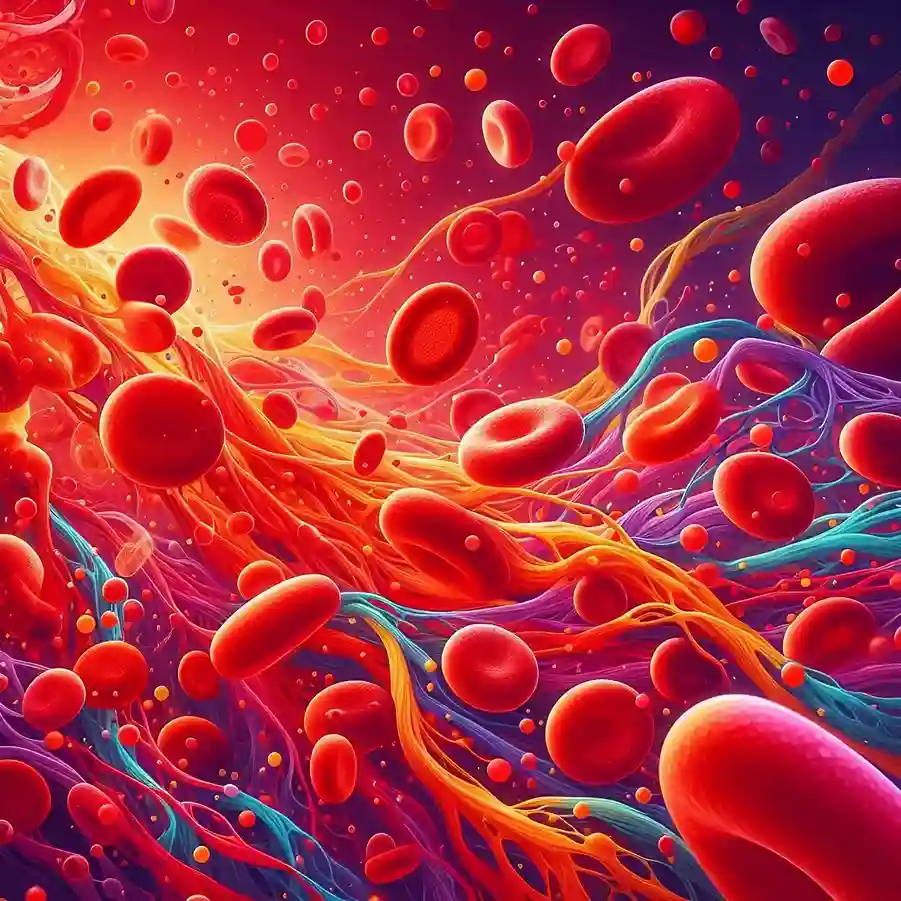
What to drink to increase hemoglobin
If you want to increase your hemoglobin levels with beverages, here are some options:
- Prune Juice:
- Dried plums, often known as prunes, are an excellent source of plant-based iron. One cup (240 ml) of prune juice contains 2.8 milligrams of iron, which is approximately 17% of the daily need. Prune juice not only increases hemoglobin but also raises energy levels.
- Beetroot Juice:
- Beetroot is naturally high in iron and can help increase hemoglobin levels. Beetroot juice is high in antioxidants and vitamin C, which improves iron absorption. It’s an excellent alternative for those with iron deficiency.
- Pomegranate Juice:
- Pomegranate juice provides iron, vitamin C, and other nutrients. It helps to boost hemoglobin levels and general blood health. Plus, it’s tasty and refreshing!
- Sugarcane Juice:
- Sugarcane juice is a natural source of iron, particularly when drunk fresh. It also supplies energy and hydration.
- Amla Juice (Indian Gooseberry):
- Amla is an abundant source of vitamin C. Daily use of amla juice boosts immunity and aids iron absorption, increasing hemoglobin synthesis.
- Apple Juice:
- Apples are an excellent source of iron. Drinking fresh apple juice with pulp might boost your iron intake.
- Banana Smoothie:
- Bananas include iron and folic acid, two nutrients required for hemoglobin formation. Blend bananas with honey to make a healthful drink.
- Orange Juice:
- Oranges are strong in vitamin C, which promotes iron absorption. Freshly squeezed orange juice is an excellent beverage to accompany iron-rich meals.
- Kiwi Fruit Juice:
- Kiwi is another fruit rich in vitamin C. Juicing it may provide a pleasant drink that helps increase hemoglobin levels.
- Spinach Juice:
- Spinach is high in iron and other vital minerals. Fresh spinach leaves may be blended with other fruits and vegetables to make a healthy drink.
Choose vitamin C-rich beverages to aid boost nonheme iron absorption. Consult a healthcare practitioner before making major dietary changes or using supplements.
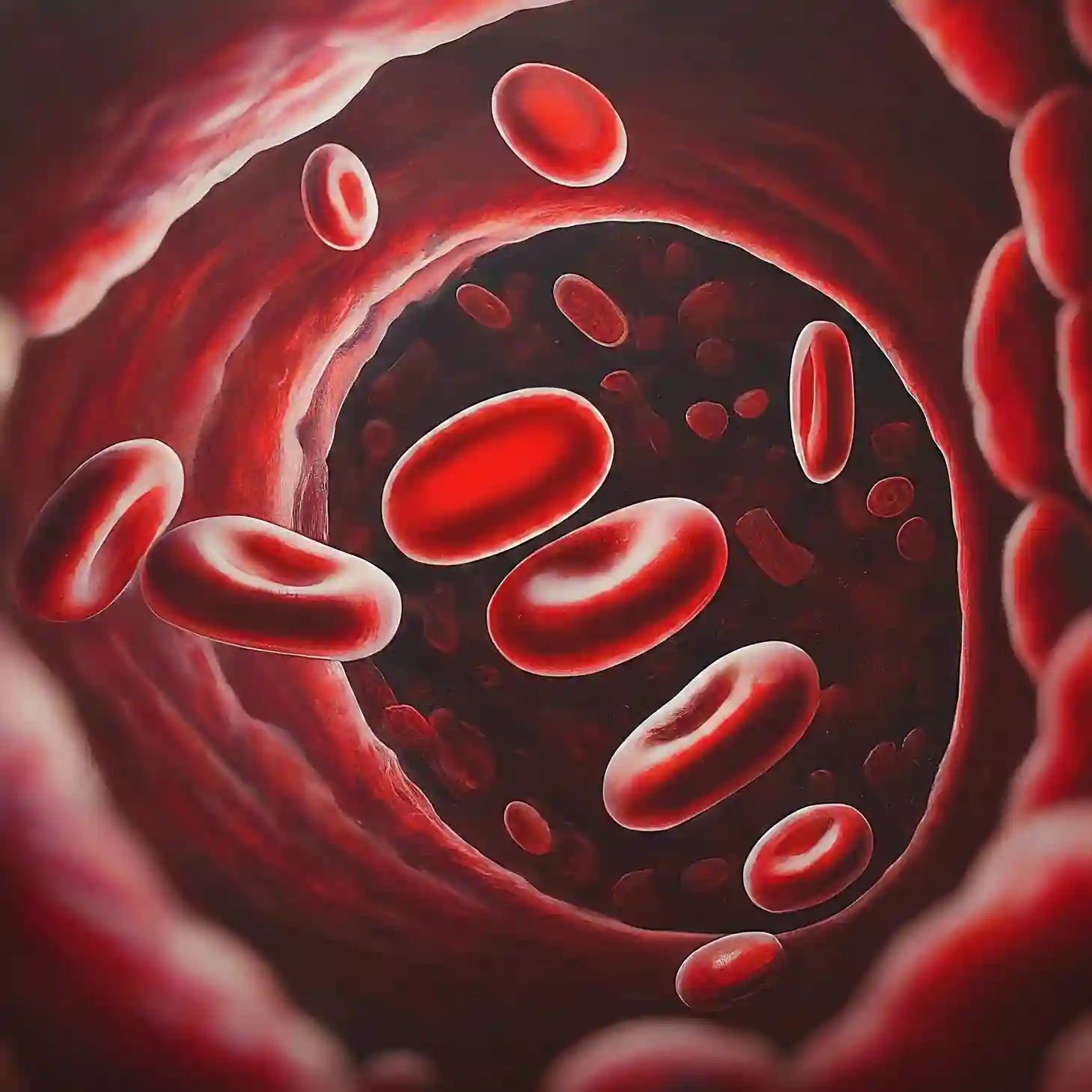
How to increase hemoglobin level quickly
If you want to increase your hemoglobin levels rapidly, here are some helpful strategies:
- Increase Iron Intake:
- Iron insufficiency is a common reason for low hemoglobin levels. Include extra iron-rich foods in your diet.
- Meat, fish, and poultry
- Organ meats
- Beans and legumes
- Eggs
- Leafy green vegetables like kale and broccoli
- Nuts and seeds
- Iron insufficiency is a common reason for low hemoglobin levels. Include extra iron-rich foods in your diet.
- Boost Folate Intake:
- Folate, a kind of B vitamin, is required for hemoglobin formation. Include foods high in folate:
- Spinach
- Beans, such as kidney beans
- Peanuts
- Fruits
- Whole grains
- Sunflower seeds
- Before considering folate supplements, it’s important to consult with a healthcare professional for personalized advice.
- Folate, a kind of B vitamin, is required for hemoglobin formation. Include foods high in folate:
- Maximize Iron Absorption:
- Certain vitamins and minerals enhance iron absorption:
- Vitamin C: Found in oranges, strawberries, papaya, guava, and sweet red peppers.
- Vitamin A and beta-carotene: Present in fish, liver, sweet potatoes, carrots, and cantaloupes.
- To enhance iron absorption, consider taking vitamin C, vitamin A, and beta-carotene supplements.
- Certain vitamins and minerals enhance iron absorption:
- Stay Hydrated:
- Proper hydration promotes blood flow and hemoglobin synthesis.
- Avoid Iron Blockers:
- Limit your intake of chemicals that limit iron absorption, such as coffee, tea, cola, and alcohol.
- Prune Juice:
- Prune juice is high in iron. Soak one spoonful of haleem (garden cress seeds) in water with lemon juice. Combine the mint paste, turmeric, jeera powder, and rock salt. Start your day right by having this every morning on an empty stomach.
Before making any substantial dietary changes or using supplements, talk with a healthcare expert.
When to Consider Supplements for Hemoglobin Boosting
- Balanced diet and healthy lifestyle are crucial for hemoglobin levels.
- Iron supplements may be recommended for individuals with iron deficiency anemia.
- Other potential supplements include vitamin B12, folic acid, and herbs like chlorophyll or wheatgrass.
- Consultation with a healthcare professional is advised before incorporating new supplements into routine.
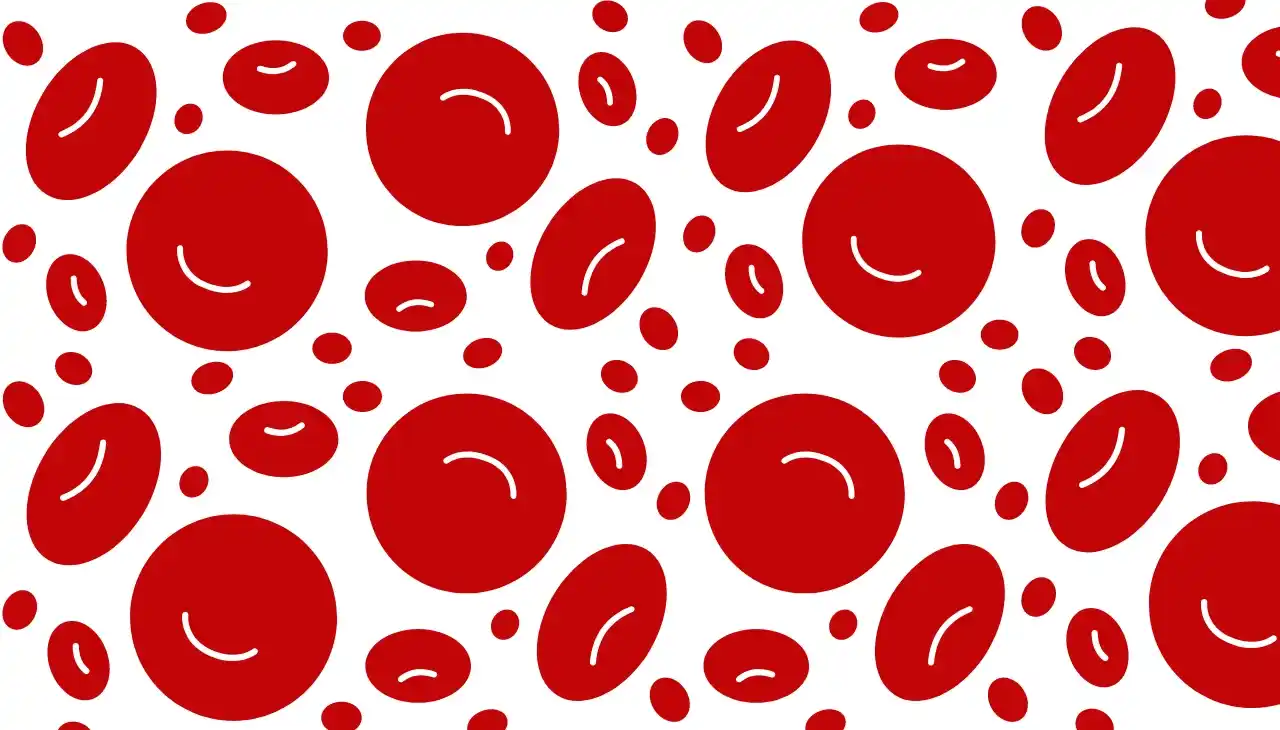
Fruits to increase hemoglobin
Including iron-rich foods and vitamin C in your diet can help increase hemoglobin levels. Here are several fruits to incorporate:
- Pomegranate:
Pomegranate is one of the most effective fruits for raising blood count. Packed with iron, as well as vitamins A, C, and E, it’s a nutritional powerhouse! Pomegranate contains ascorbic acid, which increases iron absorption and regulates blood count. For optimal results, drink a glass of homemade pomegranate juice.
- Banana:
Surprisingly, bananas are an excellent choice for iron-rich foods. They increase hemoglobin synthesis while also providing folic acid, which is required for red blood cell development.
- Apple:
An apple a day not only keeps the doctor away, but it also promotes good health. Apples are high in iron and other health-promoting nutrients that increase hemoglobin levels. For the best results, eat them with the skin.
- Prunes:
Prunes (dry plums) are another great option. They are abundant in iron, folic acid, fiber, and potassium, all of which help to boost red blood cell counts.
- Oranges:
Oranges are high in vitamin C, which helps iron absorption and increases hemoglobin production. Including oranges in your diet can help improve your hemoglobin levels naturally while also increasing your immunological function.
- Strawberries:
Strawberries are also abundant in iron and vitamin C, making them an excellent fruit to use while trying to boost hemoglobin levels.
- Watermelon:
Watermelon is not only pleasant, but it also includes lycopene, which promotes blood health and may help to improve hemoglobin levels.
- Dates:
Dates are a natural source of iron, fiber, and vitamins, making them good for raising hemoglobin.
Before making any substantial dietary changes or using supplements, talk with a healthcare expert.
Foods to increase hemoglobin
You may add a range of foods high in iron to your diet to raise hemoglobin levels. The following foods may be beneficial:
- Leafy Greens: Spinach, kale and cauliflower leaves are a great source of iron.
- Red Blood Boosters: Beetroot, Broccoli and cabbage can help increase hemoglobin levels.
- Vitamin C Sources: Broccoli, cabbage and citrus fruits like oranges, bananas and strawberries aid in iron absorption.
- Protein Sources: Peanut butter, meat, nuts, tofu, beans and eggs provide both protein and iron.
- Antioxidant-Rich Fruits: Pomegranates, spinach, berries, lentils and apples are beneficial for their antioxidant content.
- Legumes: Beans and lentils are good plant-based iron sources.
- Meat: Red meat and sea-foods is a source of heme-iron, which is simply absorbed by the body.
- Seafood: Fish and oysters, mussels, clams contain iron that can boost hemoglobin level.
Consuming meals high in folate and vitamin C is also recommended since these nutrients are essential for the formation of hemoglobin and the absorption of iron. Vitamin C is plentiful in fruits like papaya and guava and vegetables like bell peppers, while folate may be found in foods like peanuts, bananas, and fortified cereals.
Always get medical advice before beginning any new supplements or making big dietary changes, particularly if you have a pre-existing medical problem.
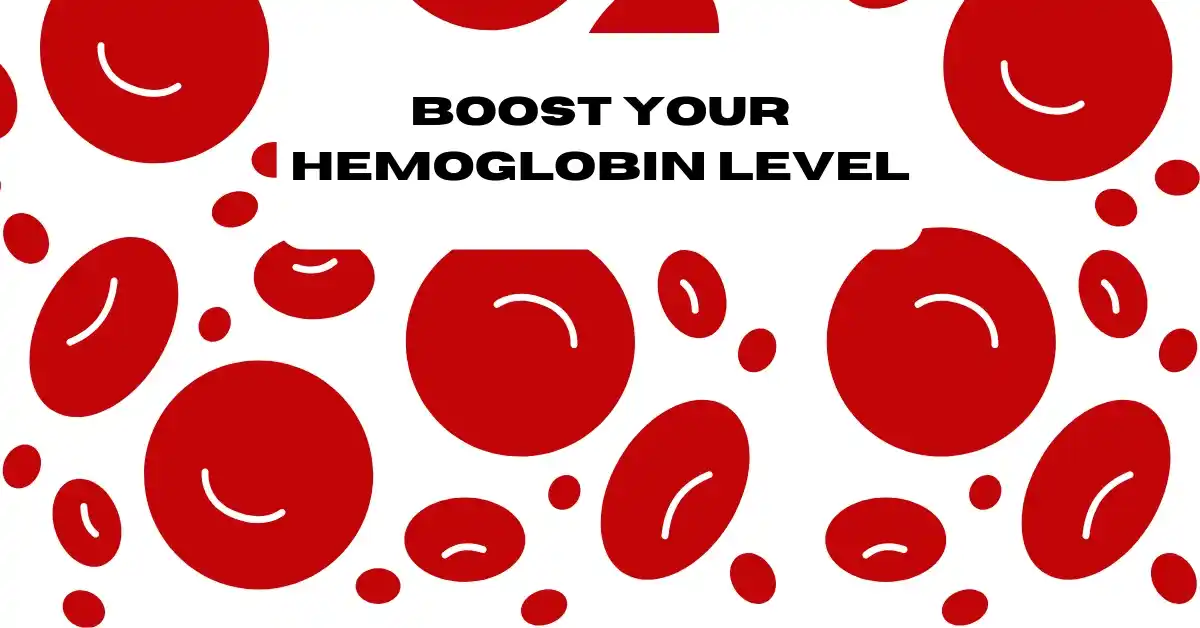
How to increase hemoglobin in adults
Maintaining proper hemoglobin levels is critical for general health. Here are some natural ways to boost hemoglobin in adults:
- Increase Iron Intake:
- Iron deficiency anemia is widespread and can result in low hemoglobin levels. Include extra iron-rich foods in your diet.
- Meat, fish, and poultry
- Organ meats
- Beans, legumes, and lentils
- Leafy green vegetables, such as spinach and kale
- Nuts and seeds
- Iron deficiency anemia is widespread and can result in low hemoglobin levels. Include extra iron-rich foods in your diet.
- Boost Folate Intake:
- Folate, a kind of B vitamin, is essential for hemoglobin formation. Include foods high in folate:
- Spinach
- Beans, such as kidney beans
- Peanuts
- Whole grains
- Sunflower seeds
- Before considering folate supplements, it’s important to consult with a healthcare professional for personalized advice.
- Folate, a kind of B vitamin, is essential for hemoglobin formation. Include foods high in folate:
- Maximize Iron Absorption:
- Certain vitamins and minerals enhance iron absorption:
- Vitamin C: Found in oranges, strawberries, papaya, guava, and sweet red peppers.
- Vitamin A and beta-carotene: Present in fish, liver, sweet potatoes, carrots, and cantaloupes.
- To enhance iron absorption, consider taking vitamin C, vitamin A, and beta-carotene supplements.
- Certain vitamins and minerals enhance iron absorption:
- Take Folic Acid:
- Folic acid (a B-complex vitamin) is required for red blood cell formation. Include foods high in folic acid.
- Green leafy vegetables
- Liver
- Rice
- Sprouts
- Dried beans
- Wheat germ
- Fortified cereals
- Folic acid (a B-complex vitamin) is required for red blood cell formation. Include foods high in folic acid.
- Consume Beetroots:
- Beetroot is strongly suggested for improving hemoglobin levels. It is high in iron, folate, fiber, and potassium. Beetroots can be cooked, or carrots and sweet potatoes can be combined to form a nutritious juice.
- Exercise Regularly:
- Workouts ranging from moderate to high intensity increase oxygen demand throughout the body, stimulating hemoglobin synthesis.
Before making any substantial dietary changes or using supplements, talk with a healthcare expert. A well-balanced diet and adequate hydration are also required for appropriate hemoglobin levels.
How to increase hemoglobin in men
- Consume Iron-Rich Foods: Include liver, red meat, shrimp, tofu, green leafy vegetables, nuts, dates, lentils, fortified breakfast cereals, oysters, and asparagus.
- Boost Vitamin C Intake: Include papaya, oranges, lemons, strawberries, bell peppers, berries, broccoli, grapefruit, tomatoes, and spinach.
- Take Folic Acid: Include green leafy vegetables, liver, rice, sprouts, dried beans, wheat germ, fortified cereals, peanuts, bananas, and broccoli.
- Include Beetroots: Rich in iron, folic acid, fiber, and potassium. Cooked or made into a healthy juice with beetroot, carrots, and sweet potato.
- Consult a doctor before making significant dietary changes or supplements.
How to increase hemoglobin in women
Maintaining normal hemoglobin levels is critical for general health, particularly for women. Here are some natural ways to enhance women’s hemoglobin:
- Eat Vitamin B12-Rich Foods:
-
-
- Vitamin B12 is essential for the development of red blood cells and hemoglobin. Include foods such as:
- Fish, meat, and poultry
- Eggs and dairy products
- Fortified cereals and nutritional yeast
- Vitamin B12 is essential for the development of red blood cells and hemoglobin. Include foods such as:
-
- Boost Vitamin C Intake:
-
-
- Vitamin C improves iron absorption. Include foods high in vitamin C:
- Papaya, oranges, lemons
- Strawberries, bell peppers
- Broccoli, grapefruit, tomatoes, and spinach
- Vitamin C improves iron absorption. Include foods high in vitamin C:
-
- Take Folic Acid:
-
-
- Folic acid (a B-complex vitamin) is required for red blood cell formation. Include foods high in folic acid.
- Green leafy vegetables
- Liver, rice, sprouts
- Dried beans, wheat germ, fortified cereals
- Peanuts, bananas, and broccoli
- Folic acid (a B-complex vitamin) is required for red blood cell formation. Include foods high in folic acid.
-
- Consume Beetroots:
-
-
- Beetroot is strongly suggested for improving hemoglobin levels. It is high in iron, folate, fiber, and potassium. Beetroots can be cooked, or carrots and sweet potatoes can be combined to form a nutritious juice.
-
- Increase Iron Intake:
-
-
- Iron deficiency anemia is widespread and can result in low hemoglobin levels. Include extra iron-rich foods in your diet.
- Meat, fish, and poultry
- Organ meats
- Beans, legumes, and lentils
- Leafy green vegetables, such as spinach and kale
- Nuts and seeds
- Iron deficiency anemia is widespread and can result in low hemoglobin levels. Include extra iron-rich foods in your diet.
-
- Consume More Vitamin E:
-
-
- Vitamin E is essential for healthy red blood cells and may be found in foods such as:
- Almonds, sunflower seeds, and hazelnuts
- Spinach, broccoli, and kiwi
- Vitamin E is essential for healthy red blood cells and may be found in foods such as:
-
- Monitor Menstrual Health:
-
-
- Women who have heavy menstrual cycles may be at risk for iron deficiency. If you feel that this is impacting your hemoglobin levels, see a healthcare expert.
-
- Herbal Teas:
-
- Certain herbal drinks, such as nettle tea, are thought to improve blood health and increase hemoglobin levels.
Before making any substantial dietary changes or using supplements, talk with a healthcare expert. Regular exercise, staying hydrated, and eating a balanced diet are all necessary for good hemoglobin levels.
Conclusion
Maintaining healthy hemoglobin levels is essential for overall well-being and optimal oxygen delivery throughout the body. By incorporating iron-rich foods, folate sources, vitamin C, and beta-carotene into your diet, you can support your body’s ability to produce and utilize hemoglobin effectively. Additionally, adopting a balanced lifestyle that includes regular physical activity, stress management, and adequate hydration can further enhance your efforts to boost hemoglobin levels naturally.
Remember, while supplements may be beneficial in certain situations, it’s always best to prioritize a nourishing, whole-food diet and consult with a healthcare professional before making any significant changes to your routine. By taking a comprehensive approach to supporting your hemoglobin levels, you can unlock the power of this essential protein and experience the countless benefits of optimal oxygen delivery throughout your body.
FAQs:
How long does it take to see an increase in hemoglobin levels after making dietary changes?
The time it takes to see an increase in hemoglobin levels after making dietary changes can vary depending on the severity of any deficiencies and the individual's overall health. Generally, it may take several weeks to a few months to see a noticeable improvement in hemoglobin levels. However, some individuals may experience an increase in energy levels and improved overall well-being before their hemoglobin levels rise significantly.
Can exercise alone help increase hemoglobin levels?
Exercise alone is unlikely to significantly increase hemoglobin levels, but it can indirectly support the body's ability to produce and utilize hemoglobin more effectively. Regular physical activity stimulates the production of red blood cells and improves cardiovascular function, which can enhance oxygen delivery throughout the body. However, for individuals with iron deficiency or other underlying conditions contributing to low hemoglobin levels, dietary changes and addressing the root cause may be necessary to see a substantial increase.
Is it possible to have too much iron in the body from consuming iron-rich foods?
While it is possible to consume excessive amounts of iron, it is generally difficult to reach toxic levels through diet alone unless an individual has a specific condition that causes iron overload. However, it is essential to maintain a balanced diet and not exceed the recommended daily intake of iron, as excessive amounts can lead to negative side effects such as constipation, nausea, and potential organ damage in severe cases. It is always best to consult with a healthcare professional before significantly increasing iron intake, especially if considering iron supplements.
Can pregnancy affect hemoglobin levels, and what should expectant mothers do to ensure healthy levels?
Pregnancy can indeed affect hemoglobin levels, as the increased blood volume during this time can lead to a relative decrease in hemoglobin concentration, a condition known as gestational anemia. Expectant mothers should prioritize consuming iron-rich foods, taking prenatal vitamins with adequate iron and folate, and staying well-hydrated. Regular prenatal checkups are essential to monitor hemoglobin levels and receive appropriate recommendations from a healthcare professional.
Are there any potential risks or side effects associated with consuming excessive amounts of vitamin C or beta-carotene for improving iron absorption?
While vitamin C and beta-carotene can enhance iron absorption when consumed in appropriate amounts, excessive intake of these nutrients can potentially lead to side effects. High doses of vitamin C can cause digestive discomfort, diarrhea, and potentially increase the risk of kidney stones in some individuals. Excessive beta-carotene consumption, particularly from supplements, has been linked to carotenodermia, a harmless condition that causes a yellowing of the skin. It is generally recommended to obtain these nutrients from whole food sources and consult with a healthcare professional before taking high-dose supplements.
